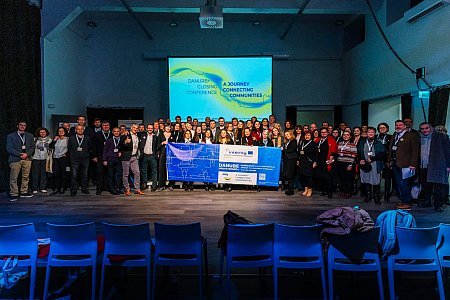DANUrB+ / DANUBE URBAN BRAND/ Building Regional and Local Resilience through the Valorization of Danube’s Cultural Heritage
(4).png)
Project duration: 01.07.2020 – 31.12.2022
Programme: Danube Transnational Program
Lead partner: Budapest University of Technology and Economics
Partner countries: Hungary, Slovakia, Croatia, Romania, Bulgaria, Serbia
Partner budget: 80,200.00 €
Project budget: 2.707,750 € (ERDF 2.047,735 €; IPA 25.3852,5 €)
Project partners:
- Budapest University of Technology and Economics, lead partner (Hungary)
- GPS City Guide Kft (PocketGuide), ERDF partner (Hungary)
- National Institute for Research and Development in Tourism, ERDF partner (Romania)
- Hungarian Contemporary Architecture Centre, ERDF partner (Hungary)
- Pest County Municipality, ERDF partner (Hungary)
- Slovak University of Technology in Bratislava (Slovakia)
- "Ion Mincu" University of Architecture and Urbanism, ERDF partner (Romania)
- National Tourism Cluster "Bulgarian Guide", ERDF partner (Bulgaria)
- Nansen Dialogue Center Osijek, ERDF partner (Croatia)
- Danube Delta National Institute for Research and Development, ERDF partner (Romania)
- Politehnica University of Timisoara, ERDF partner (Romania)
- Association for Urban Transition, ERDF partner (Romania)
- New Bulgarian University, ERDF partner (Bulgaria)
- Urban Survey Association, ERDF partner (Romania)
- Pons Danubii European Grouping of Territorial Cooperation, ERDF partner (Slovakia)
- Bluelink Foundation, ERDF partner (Bulgaria)
- Central European Foundation, ERDF partner (Slovakia)
- University of Belgrade (UNIV) - Faculty of Architecture, IPA partner (Serbia)
- New Cultural Neighborhood, IPA partner (Serbia)
- + 23 associated partners
DANUrB+ aimed to reactivate the underused cultural heritage and resources in shrinking settlements of Danube river’s peripheral and border regions in 6 countries (Hungary, Slovakia, Croatia, Romania, Bulgaria, Serbia). The underused cultural heritage has the potential to make the selected small and medium-sized settlements attractive for tourists by strengthening their cultural identity connected to Danube. Activities within the project aimed at supporting the identities of settlements along the Danube. The expected result was strengthening the local development and increase the attractiveness of the Danube region both for domestic and foreign tourists. The project activities are summarized in four areas: research, tourism, education, public events and planning projects. An important target group of the project were local communities; their activities are made visible by project implementation as well as they are provided an opportunity for networking. The educational programs aimed at educating young people in the field of cultural heritage valorization connected to Danube. As an output of the project, the unique cultural heritage and local initiatives dedicated to revitalization of the regions were made visible within an international network. The output of DANUrB+ was preparation of specific project plans resp. territorial action plans. An international brand was developed within the project, an opportunity will be provided to better monitor the expenditure of tourists visiting the regions and support the cultural routes. DANUrB+ contributes to strengthen the Danube cultural identity by organizing events e.g. Danube Days, publication of DANUrB towns (The Atlas) and a documentary. The project increases the capacity of local stakeholders for cooperation both on local and international level.
Further information: http://interreg-danube.eu

